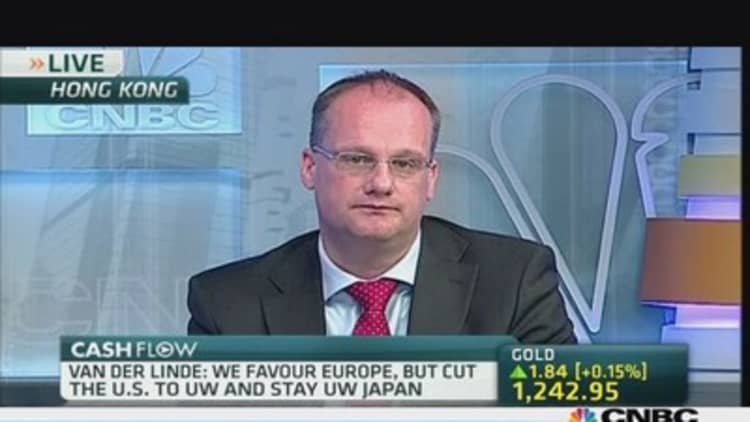
If Japan's ambitious plan to pull its beleaguered economy out of a deflationary rut falls flat this year, it won't be the only country that feels the pain, economists at asset management firm Schroders have said.
Although the first two arrows of 'Abenomics' have had some success in creating inflation and economic growth, naysayers have cast doubt over whether Prime Minister Shinzo Abe can pull off the third arrow of his plan - structural reform. Thus, they are fearful that the upcoming consumption tax hike in April could damage Japan's economic recovery beyond repair.
(Read More: Isthe Japan story getting threadbare?)
According to Craig Botham, emerging markets economist at asset management firm Schroders, if Abenomics does fail, emerging markets will be left vulnerable.
"We highlighted a number of risks to our baseline forecast [for emerging markets], one of which was a scenario where Abenomics fails," said Botham.
"In the event that yen depreciation does step into overdrive, the most likely impact seems to be on Asian emerging markets' exports to Japan, particularly in the absence of another round of emerging market currency exchange depreciation," he added, referring to the selloff the region suffered in mid-2013 amid concerns the Federal Reserve would taper its asset purchase program.
In the firm's most extreme downside scenario, if the tax hike pushes the economy back into recession, the Bank of Japan will be forced to step up its asset purchase program, further weakening the yen to a level of around 130 to the dollar.
(Read More: Why investors shouldwatch out for Japan-China tensions
At these levels the yen would create two key disadvantages for other countries in the region: a reduction in domestic demand for foreign imports; and it would make Japanese goods more attractive, giving Japanese exporters a competitive advantage.
"Assuming that Japanese companies use the fall in the yen to cut prices (rather than just boost profits through higher export revenues), those who compete with Japanese companies will feel a squeeze on their market share," said Botham.
(Read More: Is the honeymoon over for Japan equities?)
Schroders pinpointed South Korea, Taiwan and the Philippines as the most vulnerable to both weaker import demand and Japanese exporters' increased competitiveness.

Europe, the Middle East and Africa, meanwhile, would be the least vulnerable, with Latin America somewhere in the middle.
"Given that the consumption tax comes into place in the second quarter, and we see a strong Bank of Japan response occurring in the third quarter in this scenario, it may be that South Korea, the Philippines and Taiwan perform well only in the first half of 2014 before beginning to struggle," he said.
(Read More: Yen set for worst year since YMCA topped the charts)
However, Schroders added that these countries' policy makers may well take steps to mitigate the negative effects of a weak yen by implementing monetary or fiscal stimulus. South Korea and Taiwan, in particular, enjoy small fiscal deficits and low inflation levels placing them in a strong position to do so, if necessary.
Frederic Neumann, co-head of Asian economic research at HSBC, said he was not too concerned about the impact a failure of Abenomics would have on emerging markets, however.
"Most economies in Asia do not compete head-on with Japan, being far lower on the production chain. South Korea is a notable exception and Taiwan partly so, and here a weaker yen could deliver a squeeze on corporate profits," he said.
"But, in other parts of Asia, including China, the impact will likely prove more limited. Last year, despite a 17 percent depreciation of the yen against the dollar, foreign direct investment flows from Japanese firms to ASEAN markets still rose, along with bank lending. To the extent that a weaker Yen reflects such capital outflows, a number of ASEAN markets may in fact benefit," Neumann added.
Raj Biswas, Asia-Pacific chief economist at IHS Global Insight, agreed that a rapid depreciation in the yen could give Japan's trade partners cause for alarm.
"The U.S., E.U. and other key trade partners may become increasingly concerned if the yen depreciates sharply further from current levels," he said.
Schroders also added the caveat that changes in the exchange rate are not the sole driver of trade flows and a number of other factors are involved, such as commodity prices and the strength of the global economic recovery.
— By CNBC's Katie Holliday: Follow her on Twitter @hollidaykatie


